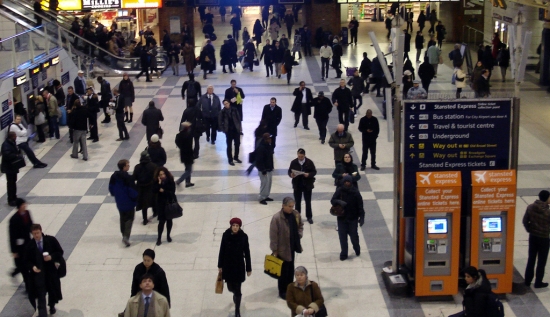British households have had a tough four years during the recession, with high inflation, the rising cost of essentials and pay freezes all adding to the strain on domestic budgets. On top of this, rising public transport costs have severely hit the pockets of those having to commute to their workplace.
In a study published by a coalition of transport unions and passenger groups, it was revealed that the price of an average train fare has multiplied at almost three times the rate of wage increases. The cost of travelling by rail is now 26 per cent higher than it was before the recession began to bite back in 2008.

Campaigners reacted to this news by staging protests at 50 train stations scattered throughout the UK on Tuesday, warning passengers that there is worse to come in 2013. They believe that the quality of service will deteriorate further whilst becoming more expensive next year, due to ticket offices shutting down, staff members being made redundant and yet more disruptions on busy routes.
General secretary-designate of the Trades Union Congress, Frances O’Grady, urged rail passengers to show ministers that enough was enough if they wished to stabilise sky rocketing price hikes in the New Year.
On the day of the nationwide protests, she said; “Train fares have massively outstripped wages and inflation, even during the recession. Train operating companies seem to have completely ignored the fact that real term incomes and living standards have fallen and have ploughed ahead with eye watering price hikes.
“Today’s protests should act as an urgent wake-up call to ministers.
“Our current privatised system, which is costing taxpayers a staggering £1.2 billion a year, may be a wonderful Christmas present for train companies but is a huge squeeze on the public purse and commuters.”
Sadly, it seems that commuters will be forced to face yet another blow to their budgets next year unless train companies scrap plans for further price rises. Ticket prices for some routes could increase by a staggering 10 per cent, yet pay rises are forecast to average only 2.5 per cent – something which will see the disposable income of commuters drop to near recession levels once more.
Julia Long, Unite union’s national rail officer, believes that the recent austerity measures announced in the Autumn Statement, combined with further increases in the cost of public transport, will have a devastating effect on the nation’s commuters.
She says; “Thanks to this Government, the new year promises to bring more misery to the country’s commuters, as the network’s private rail operators think nothing of hiking their fares.
“Once again, millions of ordinary people are being punished by this Government’s abject failure to get to grips with a crisis that is squeezing household budgets to breaking point.”
The protests took place at many of the UK’s busiest train stations, with campaigners attempting to create the maximum possible impact with their message. These included King’s Cross, Euston, Manchester, Newcastle, Cardiff, Edinburgh and Glasgow to name but a few.
Yet it was not only commuters who took to the platforms with placards – train drivers and station workers also added their voices to the throngs calling for fairer ticket prices.
Leader of the train driver’s union Aslef, Mick Whelan, spoke of his disappointment at the Government’s lack of interest in the plight of commuters.
He said; “This year’s fare hike is all the more painful following George Osborne’s announcement of deeper cuts and austerity last week, and threatens to plunge many thousands of passengers yet further into transport poverty.
“At a time of economic uncertainty the Government should be trying to help people get around, not restrict them.”
It seems, then, that for thousands of workers the days of counting the pennies are far from over as the price getting to work becomes one of the biggest items in their budgets. If the cost of commuting continues to rise throughout 2013 then next Christmas could be distinctly less merry than this one for commuters.
Do you use the rail network to commute to work, or have you chosen another method such as driving or cycling due to the continually rising costs hitting train passengers? Do you think the government should step in to restrict further price hikes in order to help people get to work less expensively and boost the economy?